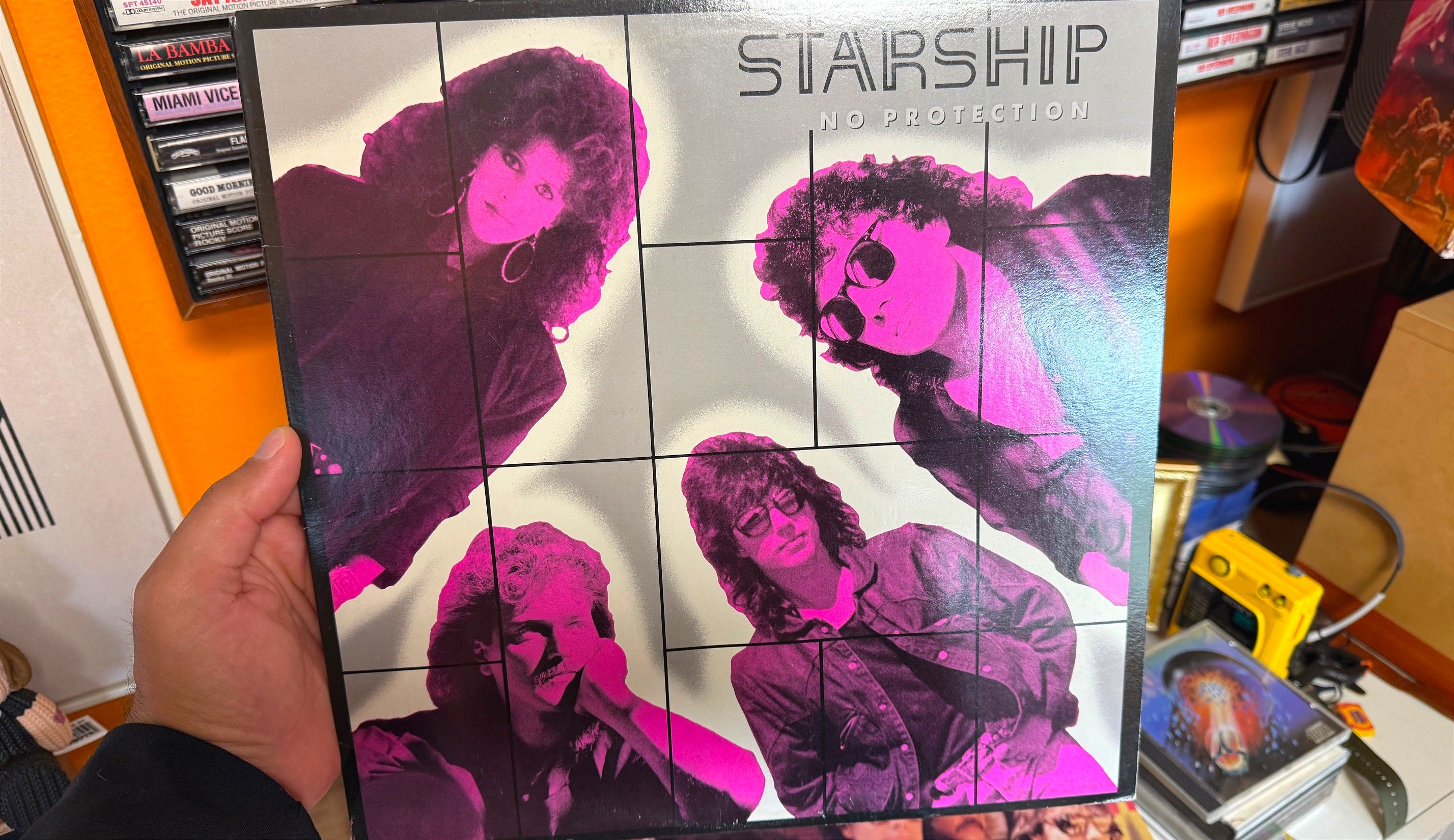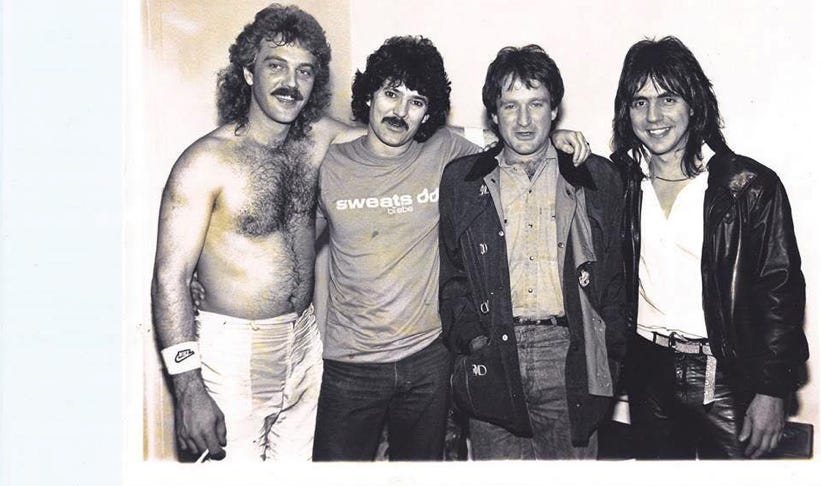Starship was everywhere in the 80s — and yeah, I loved it
From chart-topping power ballads to that endlessly debated anthem, Starship defined a moment, and whether you loved them or rolled your eyes, you definitely heard them.
Look, I know We Built This City is on just about every “worst songs ever” list, but back in the day? It was on every radio, every mixtape, and definitely my Walkman. Starship ruled the charts back in my day, and they were the sound of 80s excess, optimism, and unapologetic synth-driven drama.
This essay is part of my MUSIC SPOTLIGHT SERIES I’m writing every few weeks to engage the audiophiles that love collecting vinyl/cassettes/cds like I do, and for those that enjoy learning and discovering music from the past.
In the mid-1980s, San Francisco’s rock veterans rebranded themselves from Jefferson Airplane/Starship into simply Starship, ditching their sixties hippie badges for slick synth-pop. In fact, after founder Paul Kantner quit in 1984, a legal deal forced the band to drop “Jefferson” from its name. By 1985 the only true holdovers from the original Airplane were singer Grace Slick and guitarist Craig Chaquico, backed by a new generation of sidemen. Starship’s lineup, Slick, co-lead vocalist Mickey Thomas, Chaquico, bassist Pete Sears and drummer Donny Baldwin, plunged headlong into the mid-80s pop-rock arena.
By the mid-80s, the band’s sound had traded the fuzz of psychedelic rock for keyboard-driven anthems and hair-metal production. As Thomas later recalled, they “made a conscious effort” on Knee Deep in the Hoopla “to…try to have a couple of hit singles. Let’s just go for it.” The result was a split from their counterculture roots. Hoopla and its successor albums would be defined by glossy synths and big choruses, much to the dismay of some old-school fans .
Early Timeline: Jefferson Airplane (1965–74)
Jefferson Starship (1974–84)
Starship (1984–present) .
1984: Kantner sues, band renames itself “Starship” .
Sept 1985: Debut album Knee Deep in the Hoopla (No. 7 US, platinum) with two #1 singles (“We Built This City” and “Sara”) .
Jul 1987: No Protection (ballad-heavy album) with another #1 hit (“Nothing’s Gonna Stop Us Now,” from Mannequin) and Top-10 single “It’s Not Over (‘Til It’s Over)”.
Aug 1989: Love Among the Cannibals (last album), spawning a Top-20 hit “It’s Not Enough,” but followed by tour turmoil.
Knee Deep in the Hoopla (1985): A Pop Makeover
With Kantner gone, Slick and Thomas steered Starship into the pop arena. Knee Deep in the Hoopla arrived in September 1985 and immediately delivered radio hits. Producer Peter Wolf’s layered synths and songcraft helped launch “We Built This City,” an anthemic single that shot to number one on the Billboard Hot 100 in November 1985 . (Ironically, its lyric “We built this city on rock and roll” would later be mocked as blind hubris.) The follow-up single “Sara” also hit number one . The album went platinum, justifying Slick’s unabashed strategy. According to Rolling Stone, she gave producer Dennis Lambert the marching orders “I want to make hits” and said she planned “to tour, make a lot of money, and then retire.”
Starship’s new “album-rock” sound was a far cry from the Surrealistic Pillow era. Gone were the acid-drenched guitars and political lyrics, in came pounding drum machines, glossy keys and inflatable power-ballads. Critic Jeff Tamarkin later noted that fans of the 1960s San Francisco scene felt betrayed. They “wanted to hold on” to the old radical image and bristled when it was “tainted” by corporate pop . In interviews, Slick herself admitted the band had “sold out” to survive MTV. As Thomas summed up, by 1985 “if you wanted to survive… and to stay together, you better conform to the times – get Top 40 airplay, be on MTV.”
Those who remember Hoopla best recall its gleaming hooks and big hooks, not the revolutionary spirit of the Bay Area. Still, the strategy worked. Starship had three number one hits in 18 months, and those songs are the songs that Gen X kids know by heart.
Key Hits: “We Built This City” (1985, #1 US) – a synth-rock anthem about city nightlife; “Sara” (1985, #1) – a sweeping pop ballad; “Tomorrow Doesn’t Matter Tonight” (1985, #26); “Before I Go” (1985, #68).
No Protection (1987) – Ballads and Backlash
Starship doubled down on glossy hits with their 1987 follow-up No Protection. Its lead track was another blockbuster ballad, “Nothing’s Gonna Stop Us Now,” featured in the rom-com Mannequin. The duet (between Thomas and Slick) climbed to number one on the US and UK charts and even earned an Academy Award nomination for Best Original Song . Slick, at age 47, became the oldest woman to sing on a #1 pop hit in Billboard history – a record later broken by Cher.
Other singles from No Protection were modest hits: “It’s Not Over (‘Til It’s Over)” hit #9 US, and rock track “Beat Patrol” reached #46 . (A B-side ballad, “Set the Night to Music,” would become a 1991 hit for Roberta Flack and Maxi Priest.) But the album signaled the end of an era. No Protection came out in July 1987, and by early 1988 Grace Slick abruptly quit the band. Tired of the fray, she joked that “old people don’t belong on a rock and roll stage” as she left to briefly reunite Jefferson Airplane, then retire from music.
Love Among the Cannibals (1989): The Final Struggle
With Slick gone, Mickey Thomas became sole frontman. Starship (often billed simply as “Starship”) released Love Among the Cannibals in August 1989. It featured the single “It’s Not Enough,” a polished pop-rock song that reached #12 on the Hot 100 . However, commercial momentum had faded and the band’s personal troubles peaked on tour. In September 1989, an onstage brawl in Pennsylvania left Thomas badly injured (he needed facial surgery and titanium plates in his skull) and drummer Donny Baldwin quitting the band. The tour was delayed, and by 1990 guitarist Craig Chaquico (the last original member besides Thomas) also departed . Love Among the Cannibals would be Starship’s last studio album of the 20th century (they didn’t release a new set of songs until Loveless Fascination in 2013).
From Anthem to Punchline: Cultural Impact
In true Gen X fashion, the Knee Deep and No Protection hits eventually became punchlines. “We Built This City,” once a chart-topping anthem, is routinely cited on “worst songs” lists. Rolling Stone readers infamously voted it the worst song of the 1980s. Even its creators have mixed feelings. Grace Slick herself later cracked, “We built this city on rock and roll? There isn’t any city built on rock and roll… So it was a pretty stupid song.” In a 2016 GQ oral history, Starship guitarist Craig Chaquico shrugged that “I don’t think anybody can take all the credit, or all the blame” for the tune. Critics have lampooned Starship as symbol of corporate 80s kitsch. Marty Balin famously said the album was from a band that “had its roots in Jefferson Airplane” and was thus an easy target for backlash.
On the other hand, those big, bombastic songs are now deeply embedded in American pop culture. They echo on oldies radio (can you believe that?!), nostalgia playlists and karaoke bars. “Nothing’s Gonna Stop Us Now” often ranks among classic power ballads, and even “We Built This City” has its defenders who argue that its catchy hooks transcend the cynicism. In the 2000s and beyond, Starship’s hits have been heard with a wink, embraced as cheesy “retro gold” by those who grew up on mixtapes and classic-rock radio. After all, Mickey Thomas points out that these songs “really stood the test of time.” Younger audiences still sing them along with their parents. Time (and a few generations) have softened the jokes. The melody survives, even if the cred is long gone.
Where Are They Now? Surviving Crew and Legacies
By the mid-1990s Starship existed mostly as “Starship featuring Mickey Thomas.” In 1992, Thomas legally acquired the name and relaunched the band under that moniker. Today he still tours constantly, fronting a graying but tight veteran band. In his own words, “this is the best band I’ve ever been in,” with members who’ve stuck around for decades. The current Starship lineup includes Thomas alongside keyboardist Phil Bennett and drummer Darrell Verdusco (each with him 30 years), bassist Jeff Adams (25 years), guitarist John Roth (12 years), and vocalist Chelsee Foster (who replaced Cian Coey in 2024. Their concert setlist still leans heavily on the 80s hits. Every show must include “We Built This City,” “Nothing’s Gonna Stop Us Now,” “Sara,” “Jane,” and other classic crowd-pleasers. In short, Mickey Thomas is Starship at this point, keeping the engine running on nostalgia.
Other key figures have largely faded or passed on. Grace Slick has been out of the music business since the late 80s; she’s adamant her retirement is permanent, calling rock “a young person’s game.” Now based in Malibu, she spends her days painting and making occasional media appearances. Guitarist Craig Chaquico left the band in 1991 and pivoted to a new-age jazz career — by the 1990s he was a “Grammy-nominated, Billboard No. 1, million-selling contemporary jazz solo artist.” Original vocalist Marty Balin died in 2018 at age 76 , and founder Paul Kantner died in 2016 at 74 . Drummer Donny Baldwin later returned to the revived Jefferson Starship; bassist Pete Sears enjoyed years with Hot Tuna.
In 2025, the Starship name still cruises the concert circuit. Mickey Thomas (now in his mid-70s) and his veteran sidemen bring those retro anthems to casinos and music festivals across America. They often get a knowing smile as the audience rocks out to the very songs once derided as emblematic of everything the 1960s rebels hated. In the end, Starship’s legacy is a Gen X paradox — a band that traded ideals for hits, got lampooned for it, yet now gets to enjoy both the paychecks and a second-life of sentimental reverence. It turns out rockets made of Hoopla can still land back on Earth.
~ John
I hope you enjoyed this essay and learned something new about this iconic band. If you did, please make sure you’re subscribed and consider becoming a Paid patron subscriber for as little as a cup of coffee a month. Thank you for reading.













Just try not singing along to "We Built this City" and "Nothing's Gonna Stop Us Now."
Starship was HUGE in the 80s! Hit after hit they were definitely all over the pop charts. Sure, they sounded nothing like what they did in the 1960s but they were catering to a different audience. Plenty of people enjoyed their 80s sound. The fact that it even gets mentioned as a "joke" suggests they were doing something right at the time! People still talk about "We Built This City"...